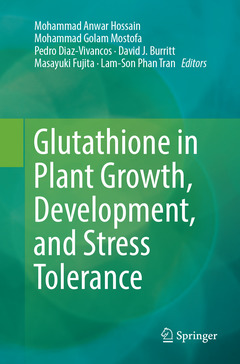Description
Glutathione in Plant Growth, Development, and Stress Tolerance, Softcover reprint of the original 1st ed. 2017
Coordinators: Hossain Mohammad Anwar, Mostofa Mohammad Golam, Diaz-Vivancos Pedro, Burritt David J, Fujita Masayuki, Tran Lam-Son Phan
Language: English
Subject for Glutathione in Plant Growth, Development, and Stress...:
Publication date: 09-2018
Support: Print on demand
Publication date: 12-2017
Support: Print on demand
Description
/li>Contents
/li>Biography
/li>Comment
/li>
Glutathione (?-glutamyl-cysteinyl-glycine) is a ubiquitously distributed sulfurcontaining antioxidant molecule that plays key roles in the regulation of plant growth, development, and abiotic and biotic stress tolerance. It is one of the most powerful low-molecular-weight thiols, which rapidly accumulates in plant cells under stress. Recent in-depth studies on glutathione homeostasis (biosynthesis, degradation, compartmentalization, transport, and redox turnover) and the roles of glutathione in cell proliferation and environmental stress tolerance have provided new insights for plant biologists to conduct research aimed at deciphering the mechanisms associated with glutathione-mediated plant growth and stress responses, as well as to develop stress-tolerant crop plants. Glutathione has also been suggested to be a potential regulator of epigenetic modifications, playing important roles in the regulation of genes involved in the responses of plants to changing environments. The dynamic relationship between reduced glutathione (GSH) and reactive oxygen species (ROS) has been well documented, and glutathione has been shown to participate in several cell signaling and metabolic processes, involving the synthesis of protein, the transport of amino acids, DNA repair, the control of cell division, and programmed cell death. Two genes, gamma-glutamylcysteine synthetase (GSH1) and glutathione synthetase (GSH2), are involved in GSH synthesis, and genetic manipulation of these genes can modulate cellular glutathione levels. Any fluctuations in cellular GSH and oxidized glutathione (GSSG) levels have profound effects on plant growth and development, as glutathione is associated with the regulation of the cell cycle, redox signaling, enzymatic activities, defense gene expression, systemic acquired resistance, xenobiotic detoxification, and biological nitrogen fixation. Being a major constituent of the glyoxalase system and ascorbate-glutathione cycle, GSH helps to control multiple abiotic and biotic stress signaling pathways through the regulation of ROS and methylglyoxal (MG) levels. In addition, glutathione metabolism has the potential to be genetically or biochemically manipulated to develop stress-tolerant and nutritionally improved crop plants. Although significant progress has been made in investigating the multiple roles of glutathione in abiotic and biotic stress tolerance, many aspects of glutathione-mediated stress responses require additional research.
The main objective of this volume is to explore the diverse roles of glutathione in plants by providing basic, comprehensive, and in-depth molecular information for advanced students, scholars, teachers, and scientists interested in or already engaged in research that involves glutathione. Finally, this book will be a valuable resource for future glutathione-related research and can be considered as a textbook for graduate students and as a reference book for frontline researchers working on glutathione metabolism in relation to plant growth, development, stress responses, and stress tolerance.
Mohammad Anwar Hossain is a professor in the Department of Genetics and Plant Breeding, Bangladesh Agricultural University, Mymensingh-2202, Bangladesh. He received his B.Sc. in agriculture and M.S. in genetics and plant breeding from Bangladesh Agricultural University, Bangladesh. He also received an M.S. in agriculture from Kagawa University, Japan, in 2008 and a Ph.D. in abiotic stress physiology and molecular biology from Ehime University, Japan, in 2011 through a Monbukagakusho scholarship. In November 2015, he moved to Tokyo University, Japan, as a JSPS postdoctoral researcher to work on isolating low-phosphorus stress-tolerant genes/QTLs from rice. He has over 50 peer-reviewed publications on important aspects of plant physiology and breeding, plant nutrition, plant stress responses and tolerance mechanisms, and exogenous chemical priming-induced abiotic oxidative stress tolerance. He has edited five book volumes, including this one, published by CRC Press, Springer,and Elsevier. He is a professional member of the International Metabolomics Society, Bangladesh Society of Genetics and Plant Breeding, Bangladesh Association for Plant Tissue Culture and Biotechnology, and Seed Science Society of Bangladesh.
Mohammad Golam Mostofa is an associate professor of biochemistry and molecular biology at Bangabandhu Sheikh Mujibur Rahman Agricultural University, Bangladesh. He received his B.Sc. and M.S. in biochemistry and molecular biology from the University of Dhaka, Bangladesh. He also obtained his M.S. in agriculture from Kagawa University, Japan, in 2012 and Ph.D. in plant and environmental sciences from Ehime University, Japan, in 2015 under a Monbukagakusho scholarship. His research focuses on plant physiology and biochemistry, abiotic stress tolerance in plants, oxidative stress responses, and crosstalk between phytohormones and signaling molecules under environmental stresses. His published works deal with the roles




